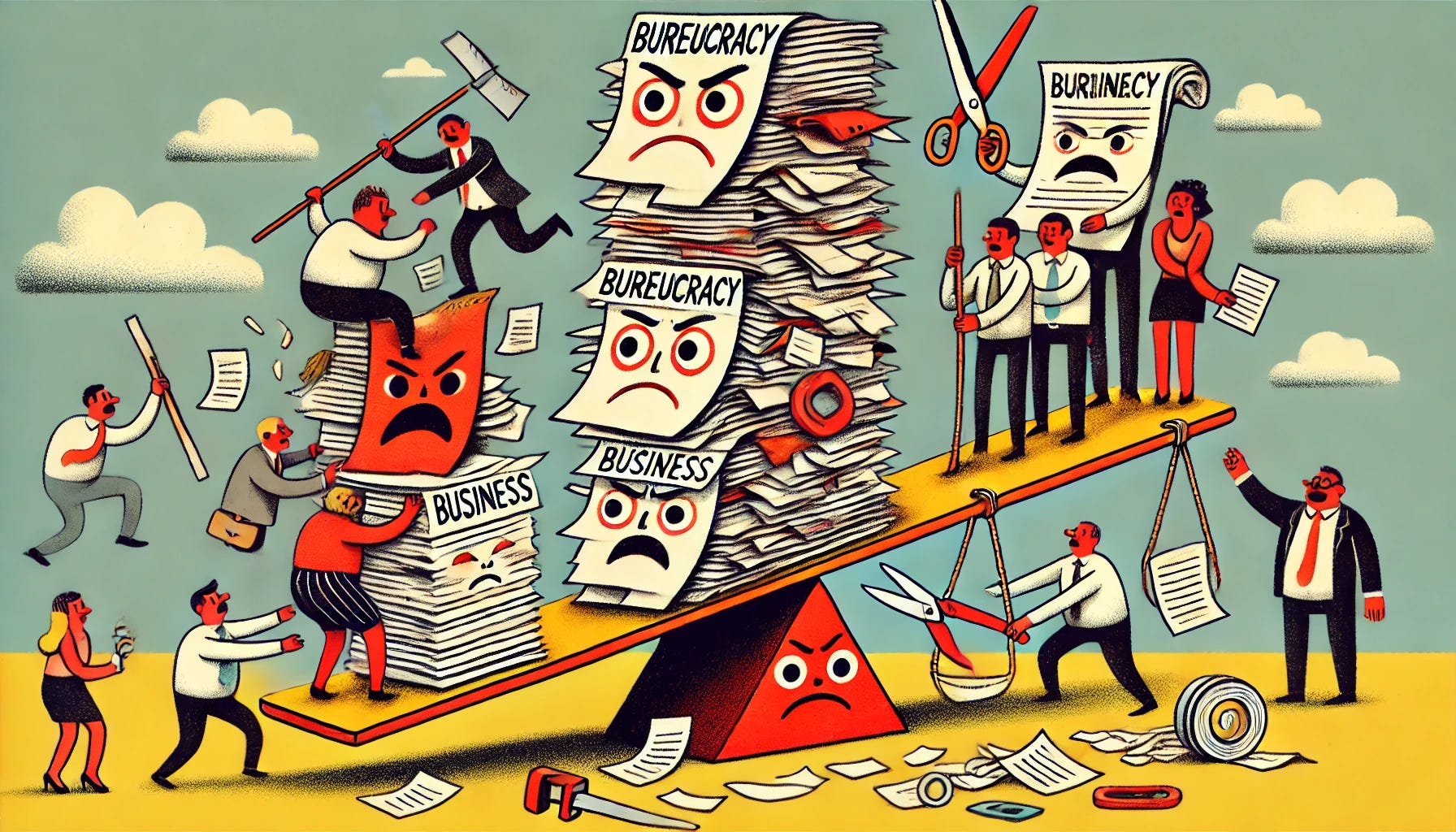Bureaucracy! F*** it?
An inevitable love-hate relationship for a functioning world.
For years, I’ve seen the belief that “bureaucracy is the enemy” grow stronger and stronger. Not that I ever fully subscribed to it, but I wouldn’t have called myself a pro-bureaucrat either. Until now.
The general narrative goes: bureaucracy slows things down, buries innovation under paperwork, and makes simple processes unbearable. But wait—bureaucracy mostly goes unnoticed until something is perceived as going wrong or moving too slowly. It’s a reflection of today’s society, where we amplify negative experiences but rarely acknowledge when things work as expected.
That got me thinking. So I started
approaching the topic from different angles. These days, the “F*** Bureaucracy” attitude is gaining momentum worldwide. But something about this movement doesn’t quite add up.
We Don’t Need More Bureaucracy—But We Can’t Afford to Lose It
Do institutions need to evolve? Absolutely. We should be using technology to empower people, making things work better—not just faster, but more reliably. Sure, we have bloated systems and outdated processes. There’s plenty to improve. But the goal shouldn’t be mindless efficiency; it should be effectiveness—a system that serves people without failing them. The idea of eliminating bureaucracy altogether? That’s a dangerous fantasy.
I’m not here to defend paperwork for the sake of paperwork. I’m here to say that strong institutions provide the foundation for taking risks. As an entrepreneur, I rely on certain rules being in place. I need to trust that my contracts will be honored, that my employees’ rights are protected, and that my business can operate within a stable system. Without that, innovation turns into chaos.
The Unsung Heroes of Stability
It’s easy to forget that behind the forms and regulations are real people who make these processes function smoothly. The ones processing my passport, handling my company permits, ensuring that I, as an individual and as a business owner, don’t fall through the cracks. We’re not talking about faceless machines—we’re talking about people who keep everything running so the rest of us can build, create, and challenge the status quo.
As an entrepreneur and investor for most of my professional career, I’ve taken more risks than the average person. People like me are often seen as the ones pushing the world forward, shaping the future, and doing the exciting work. But let’s be honest—entrepreneurship isn’t always fun, and it’s rarely as heroic or impactful as we’d like to think. What drives me is the desire to create something new, to explore uncharted territory. But without stability, that’s impossible.
As Richard David Precht put it: “The functioning of the state and the harmonious coexistence of people.” I talk about breaking rules, but the truth is, we need people who uphold them—otherwise, we wouldn’t have the freedom to innovate at all.
Innovation Thrives on Stability, Not Chaos
It’s no coincidence that the world’s most innovative economies—Singapore, Switzerland, Sweden, and the U.S., to name a few—also have strong institutions (at least for now). That’s not a coincidence. When rules are clear and institutions are predictable, businesses feel safer taking long-term risks. Entrepreneurs dedicate years to uncertainty because they operate in environments that work for them, not against them.
An enabling bureaucracy does exactly that. It doesn’t just minimize uncertainty; it actively supports progress. Stable funding for research that takes decades, structured governance that gives investors the confidence to back high-risk moonshots—these things don’t stifle innovation, they make it possible.
The Fix: Let’s Be Smart
No system is perfect, and institutions aren’t immune to stagnation. Progress is necessary. But take the recent EU initiative (
https://www.eu-inc.org/
) to create a simplified legal entity structure for European entrepreneurs. It’s not about tearing down institutions or eliminating LTDs, GmbHs, BVs, and other corporate structures—it’s about making them more effective. We don’t need less structure; we need structure that actually works for people. Technology can help, but not at the expense of reliability. Cutting red tape shouldn’t mean removing the safety nets that keep things predictable.
Because when functioning institutions disappear, history shows us what happens next. Weak bureaucracy doesn’t lead to an entrepreneurial paradise—it leads to patrimonialism, where power depends on personal connections instead of fairness. Or it paves the way for techno-fascism, where a handful of unaccountable algorithms dictate our lives. Neither of these outcomes fosters real innovation or human progress.
As Cliché as It Sounds: Let’s Build, Together
Paul Ambroise Valéry once said, “The world acquires value only through its extremes and endures only through moderation.” We need rule-breakers and risk-takers, but we also need the people who provide stability. Without them, everything falls apart.
Institutions, businesses, and organizations—whether for-profit or nonprofit—create a flywheel effect. Effective bureaucracy enables companies and individuals to thrive. In turn, those companies generate value and knowledge, helping institutions evolve into something even more effective. This cycle feeds itself, reinforcing a system where progress and stability work together.
So let’s stop fighting each other. Let’s stop blaming each other. If we want a prosperous future, we all need to step up. As a proud European, nowhere is this more urgent than in Europe, where decades of comfort have made us quite complacent.
On that note:
Gemma Gemma Gemma! Let’s go Let’s go Let’s go! Yalla Yalla Yalla!
P.S. If you truly want to escape bureaucracy, be my guest. That’s your choice. But don’t expect to come back and use the very systems and institutions you refused to contribute to—because, morally, that’s not your right.


